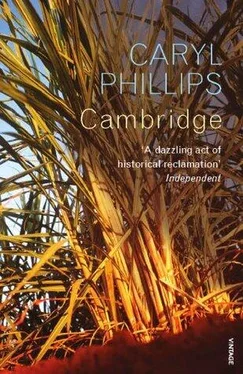Caryl Phillips - Cambridge
Здесь есть возможность читать онлайн «Caryl Phillips - Cambridge» весь текст электронной книги совершенно бесплатно (целиком полную версию без сокращений). В некоторых случаях можно слушать аудио, скачать через торрент в формате fb2 и присутствует краткое содержание. Год выпуска: 2009, Издательство: Vintage Digital, Жанр: Современная проза, на английском языке. Описание произведения, (предисловие) а так же отзывы посетителей доступны на портале библиотеки ЛибКат.
- Название:Cambridge
- Автор:
- Издательство:Vintage Digital
- Жанр:
- Год:2009
- ISBN:нет данных
- Рейтинг книги:5 / 5. Голосов: 1
-
Избранное:Добавить в избранное
- Отзывы:
-
Ваша оценка:
- 100
- 1
- 2
- 3
- 4
- 5
Cambridge: краткое содержание, описание и аннотация
Предлагаем к чтению аннотацию, описание, краткое содержание или предисловие (зависит от того, что написал сам автор книги «Cambridge»). Если вы не нашли необходимую информацию о книге — напишите в комментариях, мы постараемся отыскать её.
Cambridge — читать онлайн бесплатно полную книгу (весь текст) целиком
Ниже представлен текст книги, разбитый по страницам. Система сохранения места последней прочитанной страницы, позволяет с удобством читать онлайн бесплатно книгу «Cambridge», без необходимости каждый раз заново искать на чём Вы остановились. Поставьте закладку, и сможете в любой момент перейти на страницу, на которой закончили чтение.
Интервал:
Закладка:
No longer was I to tarry in my Africa, where my father and mother loved me with a sincere warmth. A storm broke about our dark heads and I, who can remember only my true Guinea name, Olumide, from amongst the many words of youth, was washed towards the coast and away from my rich and fertile soil by Christian Providence, whose unlikely agents were those who drink deep of strong liquors, which serve only to inflame their national madness, the slave trade. The Lord intended commerce to enable man to develop the friendly bent of his social affections. Finding his brothers in scattered locales it was hoped that man might forge the sweet blessed security of peace and friendship, while diffusing the goods and commodities of his native land. Such enterprise, with Christian religion as its true companion, would be of profound benefit to any shore fortunate enough to be rewarded with the arrival of traders with soldier-like fortitude, and honest values. It sours my blood that in the Guinea of my youth it was not to be the good fortune of my brethren to meet such men, for unfortunately our shores were visited by those whose eyes were blinded, and hearts stupefied, by the prospect of profit. These men violated the principles of sound commercial policy, and imposed upon their own nation a heavy burden, both moral and financial, for the maintenance of their addiction to slavery. Worse still, they involved the good people of their country in the sorrowful guilt of upholding such a system, thus fusing prejudice into their souls and hardening their hearts.
When I imagine myself to have been not yet fifteen years of age, I was apprehended by a band of brigands and bound by means of a chain to hand and foot. I must confess, to the shame of my fellow Guinea-men, that I was undoubtedly betrayed by those of my own hue. But it remains true that without instruction and encouragement my native people might never have hardened their hearts and tainted the generous customs of their simple country. Shackled unceremoniously to a fellow unfortunate at both stern and bow, we unhappy blacks formed a most miserable traffic, stumbling with jangling resignation towards our doom. About my neck I sported a decoration of gold placed there by my mother's own fair hand, and from my ears hung larger and less delicate gold pieces of shape, though mercifully not size, resembling the orange fruit. These paragons of virtue who had possession of my body, if not my soul, soon divested me of these trappings, thus breaking off my tenderly formed links with my parents. In addition to this loss, I was forced to endure pain the like of which I had never suffered.
Come night, our dark and snake-ish company fell into the undergrowth and descended into sleep peopled by demons of the imagination. In the morning I vigorously rubbed these visions from my eyes. Native conversation was forbidden and punishable by the lash. Day and night our ears were forced to admit their English talk which, at this stage, resembled nothing more civilized than the manic chatter of baboons. Sleep often endeavoured to elude my malnourished carcass, and on such occasions I would observe these long-haired spirits crouching feverishly around their bright fire, but I knew not whether they craved heat or if they simply feared animals. Their desire to populate the night with a brackish sacrifice formed a regular part of our uninspiring itinerary. I wondered constantly if these men of no colour, with their loose hair and decayed teeth, were not truly intent upon cooking and eating us, for they seemed overly fond of flesh, carrying about them pounds of salted meat for sustenance. Should they exhaust their supplies and feel desire rise within them for fresh quantities, it seemed to me only natural that they should turn to these helpless specimens in their charge. That Christian instruction forbade such Araby I was not to discover until some years later when I had the good fortune to fall under the spell of Miss Spencer of Blackheath, who, acting according to the renowned charity of her heart, sought to instill in my dull person the rudiments of Sabbath worship and all that proceeds thereof. However, while dressed in the spiritual and physical guise of Mungo, I truly feared the ignominy of being torn limb from limb and devoured as some worthless trifle. Lacking a family or friends with whom I might share the powerful terror of my heart, and being forbidden upon pain of death to forge verbal links with my fellow-sufferers, I would often console myself by pouring out my complaints to the very trees and bushes which masked the paths and trails along which we laboured. To them alone I recounted my sorrows, for I viewed these outer garments of nature as my only companions in life. I lamented what I took to be my own wicked heart which rendered me helpless and in this undone state, and in consequence I suffered great misery knowing not the name of God and being therefore unable to pray for His blessing and bestow thanks upon His holy name. Although ignorance prevented my making direct appeal to the author of all my comforts, He must have been sensible of my plight for Almighty God spared me while others were taken up and ushered into the next world in a multiplicity of agonies compounded by extreme sullenness. This feast of suffering was a result of the actions of these vilest of sinners.
On reaching the coast we of the despised complexion were made to understand something of the magnitude of our fall from grace. The sea saluted our reddened and miserable eyes, and pain assaulted our proud African hearts. We acknowledged by means of mutual looks of fear, the understanding that we had arrived at the edge of the known world. But we were in error. The presence of a large wooden vessel riding at anchor led us to believe that our journey — far from having achieved its natural conclusion — had not even commenced. None among us dared imagine what inhospitable regions lay beyond the waters. Surely the Lord Almighty was with me at this time, and I believe He whispered to me, a poor heathen, words of comfort. So great was His mercy that He took me in hand and enabled me to reign over my quaking terror. We bondaged brethren were herded aboard the vessel with scant consideration for age or infirmity, and treated with less regard than one might bestow upon the basest of animals. We were led to understand by other black fellows, who were evidently in the keep of these white men, that we were not to be devoured. We were informed that soon we would be transported to the white man's country, and once there sold and put to work. These human flesh merchants (for that indeed is what they were) acted towards us with such savagery and brutal cruelty that it remained difficult to believe that they expected profit to be extracted by our eventual sale. We were addressed by one common word, nigger, as though we all shared this harsh name. Clearly it was a term lacking in affection, for when it was applied it was commonly partnered by a snarl and a cuff or lash. I was later to learn the truth of this vulgar and illiberal word; it is truly a term of great abuse.
The uncivilized crew made it known that we were to be lodged below deck. One last brief glimpse of the shore was all that we were able to snatch. We fellow captives fixed our watery eyes upon the land in a state of mortal grief. Whether affection for one's country is real or imagined, it is not an exaggeration to proclaim that at this moment instinct of nature suffused our being with an overwhelming love for our land and family, whom we did not expect to see again. Our history was truly broken. With much rough handling and unnecessary ferocity, we were now ushered down into a place of perpetual night. Once below our bodies received a salutation of supreme loathsomeness in the form of a fetor, which affected a manifold increase in the constant grieving and pining which echoed among we brethren. The heat of the climate, the number of cargo, the necessity for loathsome deeds in this common space, soon rendered this wretched situation impossible. It was to be some days before the vessel set forth. In this time many died where they lay, some on top of others, until the whole scene became one of inconceivable horror. The white men came below with eatables. Those who found the strength to refuse were lashed, often to death. It appeared that bitterness and cruelty were sterner masters than mere avarice. Such malice as these men of very indifferent morals exhibited, I had never witnessed among any people. Their most constant practice was to commit violent depredations on the chastity of female slaves, as though these princesses were the most abandoned women of their species. These white vulgarians disgraced not only their nation, but the very name of man.
Читать дальшеИнтервал:
Закладка:
Похожие книги на «Cambridge»
Представляем Вашему вниманию похожие книги на «Cambridge» списком для выбора. Мы отобрали схожую по названию и смыслу литературу в надежде предоставить читателям больше вариантов отыскать новые, интересные, ещё непрочитанные произведения.
Обсуждение, отзывы о книге «Cambridge» и просто собственные мнения читателей. Оставьте ваши комментарии, напишите, что Вы думаете о произведении, его смысле или главных героях. Укажите что конкретно понравилось, а что нет, и почему Вы так считаете.












